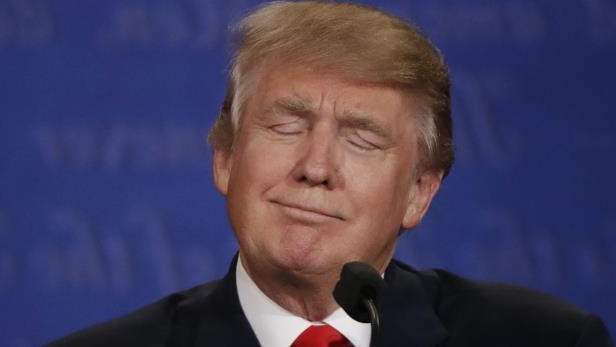GOV: The translated article from Journalisten Watch:
The First 100 Days of a US President
by Elisabeth Sabaditsch-Wolff
May 4, 2017So now they are past — the first 100 days of Donald Trump as President of the United States of America. Critics and media worldwide longed for this moment, so serious Trump-bashing could begin. And so it came to pass, in America as well as in Europe — a Niagara Falls of “I told you so” about the President from Trump opponents. On balance, President Trump’s first 100 days are many things, but surely no more chaotic than Bill Clinton’s start in the 1990s. For Trump and his circle, the results thus far may be more ambiguous than they hoped or expected. Ultimately, this judgment is inconclusive. After 100 days, there remain another 1,350 days in office, before he runs again. There will be enough time to analyze hard facts and statistics and make a judgment.
No one is surprised that Trump praises his accomplishments in the first 100 days, nor that the opposition vigorously criticizes his actions. What should be of interest to the European observer are the facts, rather than the emotional reactions to the undeniably most powerful man in the world, whose decisions, after all, even encompass those whose nationality did not allow them to vote in the November 2016 election. And the facts have a different story to tell. The nationwide daily paper USA Today recently compared the first 100 days of the last six presidents — Ronald Reagan, George H. W. Bush, Bill Clinton, George W. Bush, Barack Obama and Donald Trump, including their successes and their setbacks.
Surprisingly, Donald Trump is in good company here. For example, by the cut-off date of April 21st, 24 of his nominees for cabinet and other positions were confirmed by the Senate. For Obama, it was 69 of 190 nominees; for Clinton, 49 of 176; for Reagan, 80 of 128. Among significant Trump successes are the nomination and Senate confirmation of Neil Gorsuch to the Supreme Court, the reversal of several executive orders from the Obama administration and, with some reservations, his military reaction to the poison gas attack in Syria, although as yet the proofs of Assad’s agency are sparse. We might also mention his reaction to the provocations of the North Korean dictator and the elevation of China’s importance in the conflict.
And note should be taken of the failure of the Republican-majority House, which left Trump in the lurch during the effort to replace the Affordable Care Act (Obamacare). Leader of the House Republicans, Paul Ryan, who was (is?) a proven enemy of Trump, was not able to find a majority for Trump’s project. Counter-intuitively, it was the “Freedom Caucus,” the conservative Republican group in the House, who threw obstacles in the way of proposals of the president they had supported, contributing to one of his most significant defeats — failure of “Repeal and Replace.” And this was one of Trump’s central campaign promises. The bill (proposed law) did not go far enough for the Freedom Caucus, while the “moderate” Republicans also withheld support because of concessions to the Freedom Caucus, so the Republican majority remained unavailable.
Attempting to enact another campaign promise brought one more defeat which could have unfortunate results for the security of the American public. Trump promised a moratorium on immigration from majority Islamic countries already judged by his predecessor, Barack Obama, and the Congress to be problematic for security. Critics and civil rights organizations were not slow in seeking to have judges cancel the president’s decrees. This was never a “travel ban on Muslims.” It was always about the immigration of citizens of majority Muslim countries. And it was also not a permanent travel ban, but a moratorium until certain questions could be cleared up. There are no discussions of the obvious amateurism in carrying out the two executive orders. However, according to former US Attorney Andrew McCarthy, it is the task of the president under the US Constitution to govern international affairs. Further, the entry and/or immigration laws assign the president the right to issue temporary entry provisions for the maintenance of national security.
Precisely this was the result of President Trump’s executive order. Due to a lack of knowledge of the US Constitution, this function of the president’s office is not understood by most Europeans, so Andrew C McCarthy’s valuable (English language) analysis of the two executive orders is recommended.
So how should Trump’s presidency thus far be evaluated? Is it catastrophic, indeed dangerous in its dilettantism, as one side maintains? Or is it a great success — no Ifs, Ands or Buts — as the other side says? Let us move on from proverbs and mottoes. Trump has finished 100 days of his presidency — no more and no less. Like his predecessor, Obama, Trump has inherited many problems and must “iron them out,” while still keeping his campaign promises. Doubtless his governing style takes some getting used to, but judging all his decisions negatively because of that is definitely not helpful. Even a Donald Trump must be allowed to make mistakes, to revise or change opinions, such as on the necessity of NATO.
What could become problematic for Trump is not resolving his campaign promises. There is still no wall between Mexico and the USA — not even a bill for its financing and construction. At the next election (congressional elections in November, 2018), voters will deliver an initial evaluation, which is as it should be in a democracy. Until then, we should all loosen up a little about his style and judge him by his deeds, affording him the respect that an elected president deserves. Above all, the violent protests by Trump critics should be cease, should be condemned from all sides and the violent criminals properly convicted.

